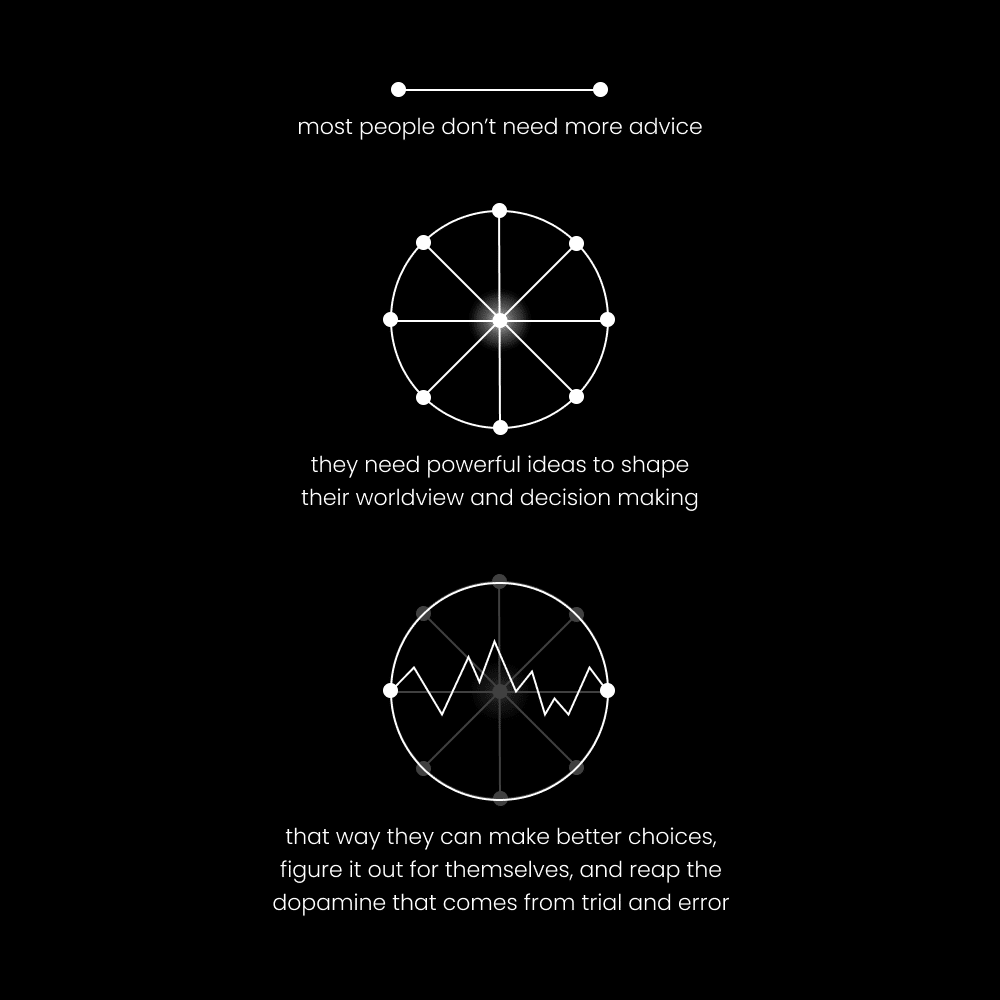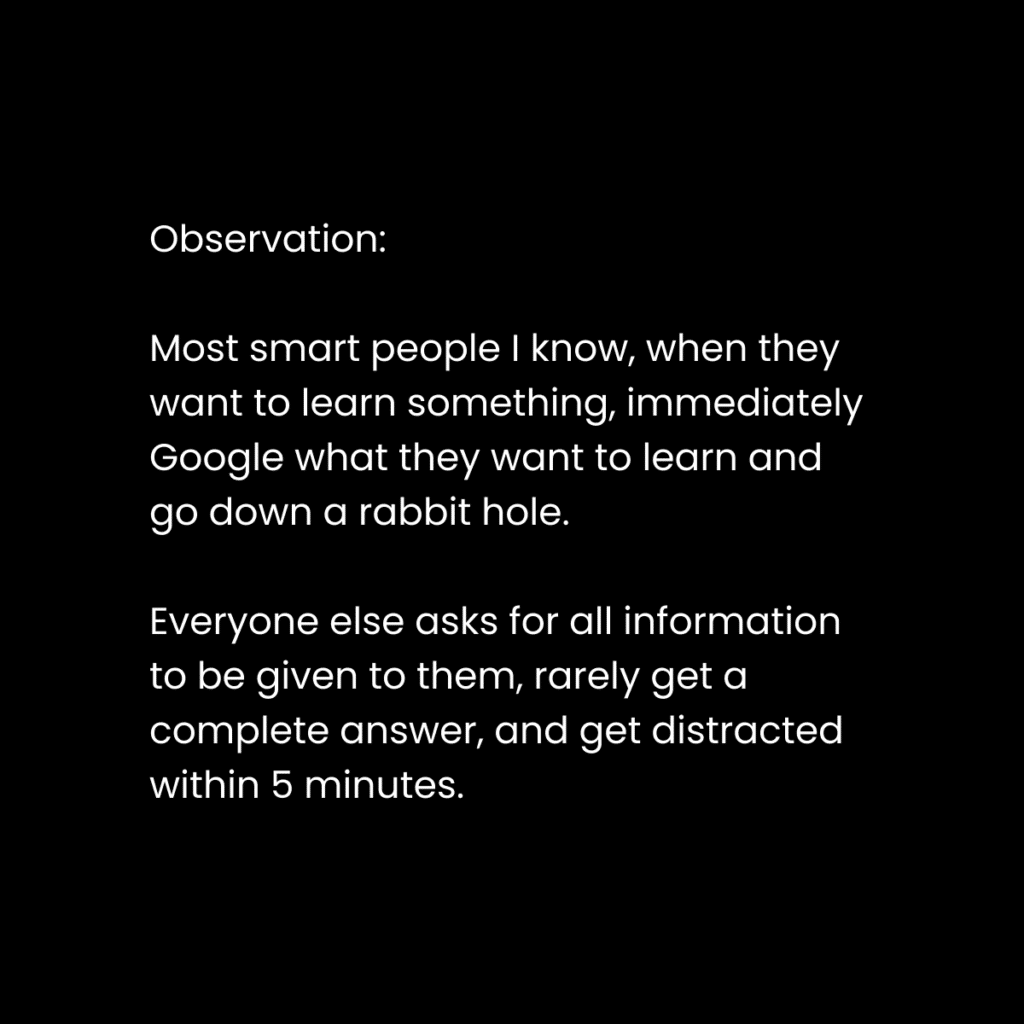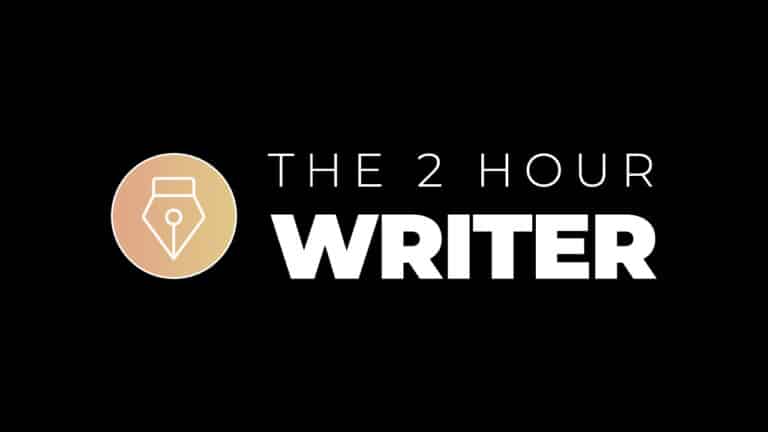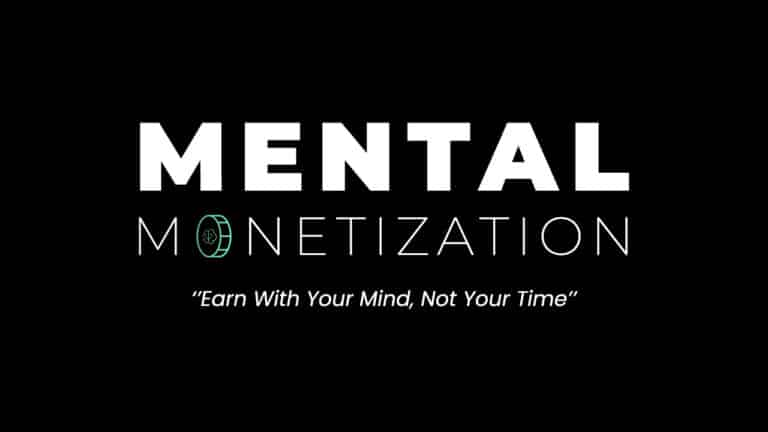“How do I start a business?”
“How do I start talking to people?”
“How do I start pursuing my goals?”
By starting.
(Asking for advice is not starting).
Asking for advice is making you stupid.
Most people ask for advice because they fear the embarrassment and failure that everyone else went through to achieve their goals.
Don’t get me wrong, advice isn’t always a bad thing.
But if 99% of people that are unsuccessful ask 99% of the advice… maybe there’s a lesson there.
That’s why there are books upon books worth of information on “how to start a business” or “how to get 6-pack abs” and 99% of people still fail.
And 99% of the advice people ask is so vague that it is impossible to answer. It is a literal waste of time to even ask the question.
“How do I start a business?”
Ah, yes, let me write 4 books, my entire life journey, and redo the 100 YouTube videos I made just for you so that you don’t have to do any of the work.
Write your own book.
Live your own life.
Stop sitting around doing things that don’t result in experience boosts.
You will never get a truly actionable answer by outsourcing your entire learning journey out of fear of that journey.
The problem is a lack of understanding.
People don’t understand how to learn.
They’ve never sat down and contemplated what the learning process looks like.
And most haven’t even asked for advice on how to learn (my point: people are asking the wrong questions from the get-go).
When they approach a new goal, they don’t have the learning process framing their decisions:
- Have a conscious meaningful goal
- Start forming the habits that allow that goal to be achieved
- Manage the pain and emotions that come with identity change
- Program your mind with information relevant to that goal
- Experiment with different techniques
- Seek technical advice when you encounter problems along the way
And when you get to that last part… advice is only as good as it is specific to your situation.
Books, podcasts, articles, and social media content have great advice, but only .001% of it applies to the exact situation you are in. The millions of bits of information you can perceive at this very moment of your life will be vastly different in the next second (and completely different from anyone else’s experience and interpretation of that experience).
Only once you are in a state of pain, struggle, or challenge can you receive the insight necessary to transcend to the next level.
There is a process to receiving the best advice.
That way you don’t get mentally overweight with useless knowledge.
Let’s break down identity change, self-experimentation, and how to ask for advice so you can supercharge your learning:
You Don’t Need More Advice, You Need To Change Who You Are

The reason you haven’t achieved a goal is that you aren’t the person that would have achieved the goal.
Every new goal you set is like throwing an anchor into the unknown.
Every new goal you set demands a new worldview, specific skills, and beliefs that form who you are.
Like a video game.
There’s a reason you aren’t level 100.
You lack the character development that turns you into a level 100.
In video games, risk isn’t real.
In real life, risks are real but often inflated with thought.
All change requires a change in identity.
You can’t just take advice and expect it to give you the experience required to reach the level of goal you’ve set for yourself.
When was the last time you actually took the advice you asked for?
Out of all of the advice you’ve gotten, how much did you actually listen to?
Most advice you get isn’t applicable to your current level of goals and understanding.
A level 100 is going to tell you something that makes sense to them, but not to a level 10.
People don’t realize that the difference in experience is exponential.
In a game, each higher level requires more experience.
Getting from level 10 to 11 may require 300 experience points.
Getting from level 99 to 100 would require 100x that amount.
As a beginner, you don’t have to change too much. You change a few habits, set aside an hour a day, and you can replace your income within a year (ish).
After that, the real self-development journey begins. Progress slows down, like the “noobie gains” phenomenon in the gym. You gain strength and muscle rapidly for the first year, then it becomes a slow and painful grind.
If your identity is not patient, focused on the long term, risk-tolerant, and a lover of failure, you will lose.
1) Programming Your Worldview
Your worldview influences the openness of your perspective.
The openness of your perspective influences your perception of situations.
Your perception of situations influences the decisions you make.
The decisions you make influence how you act.
Your actions form an information feedback loop that programs your identity or sense of self.
Your identity shapes your worldview and your worldview shapes your identity.
How do you begin to change who you are?
By treating self-education and skill acquisition as a necessary part of your everyday life.
It baffles me that very few people do this.
They want to become a better person.
They want to achieve great things.
They want to be at peace.
But they don’t realize that their ability to maneuver toward these desirable outcomes comes from having the skill to do so.
Skill is where the mind meets life.
Skill is cultivated through education and practice.
The difference between where you are and what you want is skill. Not belief. Not knowledge. Not environment. Not socioeconomic status. Not your upbringing. All of those are variables, powerful ones, that are trumped by skill.
It all starts with programming your mind with the right inputs.
Swap mindless scrolling for intentional learning.
Swap video games for building new projects (same thing, but in the real world).
Swap sleeping in for a morning walk and a book, podcast, or video that will open up new possibilities in your life.
Learning leads to awareness of opportunity. Awareness of opportunity creates motivation. Continuous learning (every single day) changes your decision-making with time.
2) The Pain Of Identity Change
Changing who you are is like sculpting a work of art.
By the time you turn 18, you are like a giant, square, slab of marble that looks, feels, and acts ugly.
The first decision is the most painful.
A commitment to change.
To *pop* an arm out of the marble against its will so you can start sculpting away.
Be careful now.
If you strike too hard, you may destroy the entire slab.
You must make small, precise taps to sculpt your ideal mental physique.
Every situation presents a small tap that can be made.
You must approach situations consciously.
When you feel that spike of anxiety, pause and push through.
The pain is temporary.
All growth requires pain.
3) Pain Is Pleasure, Death Gives Life
I was listening to an old Roof Talk video from Frank Yang this week.
When I was a teen, I would listen to these and have no idea what he was saying (I just wanted to be weird and wise with esoteric knowledge to look cool in front of my friends).
He made an interesting point about death.
What if death is the ultimate truth?
To become one with what is.
To dissolve all mental limitations and barriers between self and Source.
We have two drives (as said by Freud):
- Sex drive – creation, survival, and extending our lives in the matrix
- Death drive – destruction, absolute, and returning to Infinity
I will be talking about these in the next letter (why you can’t escape the Matrix), but Frank’s point was this.
We enjoy pain, but many people hide from that and inflict more, unbearable pain with surface-level pleasurable activities that keep you “comfortable.”
Some seek it out at the gym, in business, and through personal development. They shed layers of their ego to get as close as possible to a mental death they can – that’s the goal of the monks, mystics, and self-improvers.
The lesson is to create an environment (like the gym) to generate suffering that leads to new life.
I do not think absolute ego death is the answer, so I will not discuss that here.
And please, understand that I am not talking about a physical or materialist paradigm type of death. I’m talking mental. Symbolic.
The Power Of Self-Experimentation (How To Solve Your Problems For Good)

Self-experimentation is the only way to solve your problems for good.
Self-experimentation and self-reliance go hand in hand. They feed into each other.
Self-experimentation is how you avoid the dangerous nature of prescriptions and how-to advice.
A hypothetical problem:
Not having enough money to do what you enjoy with your time.
Person A:
Follows exactly what a money guru says.
They start investing a few bucks here and there.
They play it safe with their stocks.
They downgrade their car so they don’t have that monthly expense.
Person B:
Pulls advice from multiple sources to make decisions for themself.
They use how-to advice, but only to discover principles that can be integrated into the pursuit of their goals.
They study religiously, but do not attach to business, health, or social ideologies that keep them stagnant.
Eventually, with education and effort, it *clicks* and they know how to make it work.
I recently saw a post on Instagram about how wealth generation is slow, which I agree with, but not THAT slow.
The post was about how every person that became a millionaire under 30 had either an inheritance, a high income, or a large income event (like crypto).
The person that shared the post mentioned how they’ve had an inheritance, and have been budgeting, but are only halfway to one million in their mid-30s.
I say this for perspective, at 26 I became a liquid millionaire (until I invested 50% of it into a new business) with a $3.5 million a year revenue one-person business.
Nobody could teach me to do this… because so few have done it before with the path I took. It wasn’t even a possibility just a few years ago. Technology has made it possible, and very few have taken advantage of it.
I can’t teach the exact path, because it’s highly individual.
Of course, I can teach the principles, give you systems, and show a map of how I did it in things like 2 Hour Writer and Digital Economics – but even you will have to go through the education and effort of making it work for you.
Let’s walk through some tangible steps to achieving any goal you set your mind to:
1) Have A Conscious Goal
Goals provide a frame for your decision-making.
I don’t want to hear the regurgitated “systems are greater than goals!” advice you got from James Clear.
You can’t have a system without a goal. Simple as that.
You need a goal that grows into a vision.
One that you keep top of mind so you can collect fuel to the motivation that goal gives you.
You don’t just feel ultra-motivated out of nowhere.
You sit with a goal, experience life, and generate reasons to achieve that goal through study and observation.
The more energy you invest in a goal (education and effort) the stronger the gravity of that goal. It begins to pull you towards it effortlessly.
2) Holistic Understanding
Big picture is greater than technical details.
Principles are greater than tactics.
But that does not eliminate the need for technical details and tactics (just like how systems don’t remove the need for goals).
You will fail in business if you do not understand every moving piece of the business you are trying to build.
You will fail in fitness if you don’t have a holistic understanding of your body, nutrition, and training.
And, if you don’t understand the vast negative impacts of the environment, modern foods, and stress – you will succumb to them.
Awareness makes positive decision-making much, much easier.
If you don’t have a big-picture understanding of what you wish to achieve, you become susceptible to ideologies that are by definition of an ideology untrue in a relative world.
You will fall for get-rich-quick schemes, fad diets, and strict advice just to start over from scratch when you realize they aren’t sustainable.
When you approach a goal, education and effort go hand in hand to create understanding.
- Purchase general books, listen to podcasts, and follow social media accounts that dish out various perspectives.
- Pursue your goal with the time you have and implement what you learn. Action solidifies true knowledge.
- Adjust your decision-making as you learn. You will suck at first. That’s the reality of any new endeavor.
3) Experiment With Various Techniques
As you educate toward your goal, you will discover techniques to test.
In business, this looks like writing advice, lead generation advice, best business models, and anything else you can find with a quick Google search.
This is easily accessible information that anyone can (and will) pursue.
If it’s easy to find, chances are you aren’t going to be a special success case.
I wish I could give concrete advice, but that would leave you with the same problem.
Again, self-reliance.
You must try the techniques you are given so you can learn the underlying principles through experience.
As you learn the truth, new opportunities (that others can’t see) will make themselves known to you.
I would have never considered being a creator if I didn’t already have 7 failed businesses under my belt.
I wouldn’t see the immense benefits of it.
I wouldn’t have been able to make it work (because I didn’t have an evergreen skill set).
You experiment with techniques to increase your skill stack.
Skills compound and allow you to perceive and act on better opportunities.
4) Systemize What Works
As you gain clarity on what you want to do, there will be “levers” that bring you the most results.
Certain techniques will get you 1% better results than the next person. That is your edge. Because that 1% compounds.
I can write for 30 minutes every single morning and repurpose that content for all platforms. This is what (with time) brought in multiple millions of followers and dollars.
I saw writing as a lever for traffic.
I saw a newsletter as an infinitely repurposable piece of content.
It took me a long time at first, but as my skill increased I was able to systemize the time down to 30 minutes each morning.
This won’t look the same for a beginner.
On something like social media, you will have to:
- Reply like a madman to get eyes on your account and content
- Practice writing content that gets shared (and brings in followers)
- Build a product or service that solves your own problems
- Start to write longer form content to build trust and make sales
Your systems will evolve and change.
If they don’t, you leave growth on the table.
I still know people with 100,000 followers (that are making 5-10x less than me) because they don’t know how to evolve their systems.
They still waste 1-2 hours commenting every day instead of building the next aspect of their vision. This becomes a massive time suck as you grow (I don’t want to hear any opinions from people with less than 50,000 followers, you don’t have understanding or experience).
This letter wasn’t the most actionable, but that’s the point.
For every piece of actionable advice given there are 100,000 people that never see success with it.
So, stop masturbating to “all actionable advice and no fluff” when you need the fluff for nuanced understanding.
Don’t be an advice junky.
Do what you want and get better at doing it through education and effort.
Have a great weekend.
– Dan




